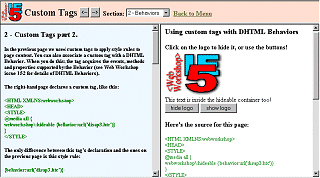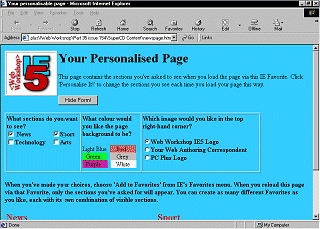|
|
 You'll
find some exotic descriptions of XML (eXtensible Markup Language) on the
Web, but for me at least, the phrase "tags you make up yourself"
sums it up. IE5 has built-in XML support, which means you can declare your
own tagnames at the start of a document, then use them like ordinary HTML
tags in the document body. You'll
find some exotic descriptions of XML (eXtensible Markup Language) on the
Web, but for me at least, the phrase "tags you make up yourself"
sums it up. IE5 has built-in XML support, which means you can declare your
own tagnames at the start of a document, then use them like ordinary HTML
tags in the document body.
 The effect is really no different to associating standard HTML tags
(such as <DIV>s) with style classes, but the tags look impressive,
and have the advantage of being completely ignored by other browsers, making
them a good way to implement IE5-only event handling routines. The
Custom
Tags Guide
explains all, with examples. The effect is really no different to associating standard HTML tags
(such as <DIV>s) with style classes, but the tags look impressive,
and have the advantage of being completely ignored by other browsers, making
them a good way to implement IE5-only event handling routines. The
Custom
Tags Guide
explains all, with examples.
Since the introduction of JavaScript (Netscape 2.0/IE 3.0) the main
browsers have supported cookies, a way of storing small amounts of data on
browsers users' hard disks (see PC Plus issue 129 for details). IE5 still
supports cookies, but also has a new alternative - data persistence.
Persistence comes in four types, three of them special-purpose and one a
general-purpose system that breaks through the cookies' 4K maximum data
size limit.
 The special-purpose persistence features let you add data to IE5
Favorites (bookmark) files, make pages 'remember' object properties as you
browse between them, and embed data in the web page source files created
by IE's Save As command. The general-purpose persistence feature lets you
store simple data items and retrieve them in other pages, just like
cookies, but allows a more generous 64K of data per page, and 640K per web
site domain. It can also create multi-level structured XML data
stores - although I've stuck to simple data items here! See the Persistence
Guide for
details. The special-purpose persistence features let you add data to IE5
Favorites (bookmark) files, make pages 'remember' object properties as you
browse between them, and embed data in the web page source files created
by IE's Save As command. The general-purpose persistence feature lets you
store simple data items and retrieve them in other pages, just like
cookies, but allows a more generous 64K of data per page, and 640K per web
site domain. It can also create multi-level structured XML data
stores - although I've stuck to simple data items here! See the Persistence
Guide for
details.
Most of Microsoft's IE-related website pages have moved around yet
again, but seem to have found a permanent home now. Check out my updated selection of IE5 authoring-related
pages, including relocated 'what's new' pages and the massive Site Builder
Workshop sections - now renamed Web Workshop!.
Until next month, happy authoring!
Back to menu
|
 Web Workshop
issue 154 -
IE5 Part 2
Web Workshop
issue 154 -
IE5 Part 2 Web Workshop
issue 154 -
IE5 Part 2
Web Workshop
issue 154 -
IE5 Part 2 More on authoring for Internet Explorer 5.0
this month, as we show you how to create your own tags, and investigate IE5's
Persistence Behaviors (no, they're not a timeshare sales technique, they're
'super-cookies' which let you store data on your users' hard disks!). Paul Stephens
More on authoring for Internet Explorer 5.0
this month, as we show you how to create your own tags, and investigate IE5's
Persistence Behaviors (no, they're not a timeshare sales technique, they're
'super-cookies' which let you store data on your users' hard disks!). Paul Stephens You'll
find some exotic descriptions of XML (eXtensible Markup Language) on the
Web, but for me at least, the phrase "tags you make up yourself"
sums it up. IE5 has built-in XML support, which means you can declare your
own tagnames at the start of a document, then use them like ordinary HTML
tags in the document body.
You'll
find some exotic descriptions of XML (eXtensible Markup Language) on the
Web, but for me at least, the phrase "tags you make up yourself"
sums it up. IE5 has built-in XML support, which means you can declare your
own tagnames at the start of a document, then use them like ordinary HTML
tags in the document body.